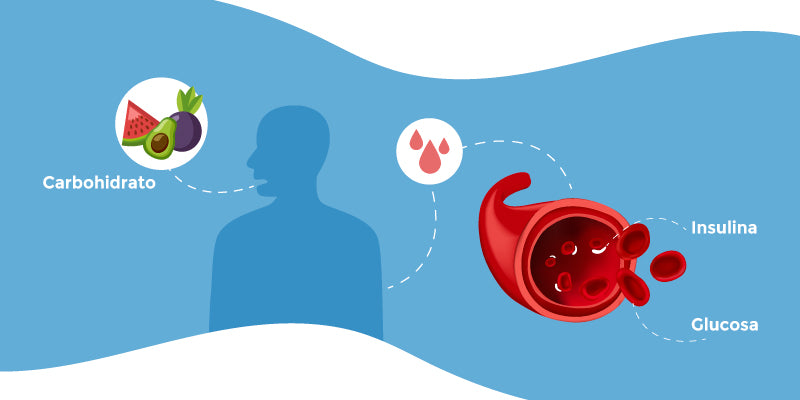Types of carbohydrates and their role in weight loss

Carbohydrates have always had a bad reputation, mainly because they are associated with “getting fat.” But in reality, not all of them are bad for you. Do you even know all the types of carbohydrates there are?
Understanding the basics about them will give you an advantage because this way you will know how they act on your health and performance.
Here we will show you all of them and how you can use them to your advantage in your goal of losing weight.
What are carbohydrates ?
Along with protein and fat, carbohydrates are one of the three main nutrients found in foods and drinks.
They are sugar molecules that your body breaks down into glucose. And blood sugar is the main source of energy for the cells, tissues and organs in your body.
Glucose can be used immediately or stored in the liver and muscles for use in all your daily tasks.
Types of carbohydrates
There are two types of carbohydrates: simple and complex.
- Simple carbohydrates: are smaller and easier to process molecules, known as monosaccharides and oligosaccharides. These contain one or two sugar molecules linked together.
- Monosaccharides: These are the simplest form of carbohydrate and cannot be broken down further as they contain only one sugar group. Examples: glucose, fructose, galactose, mannose and ribose.
- Oligosaccharides: consist of short chains of monosaccharide units. Examples: sucrose, maltose, lactose and trehalose.
- Complex carbohydrates: They are called polysaccharides, since they have more than two sugar groups linked together.
| The digestibles: starch and glycogen dextrins. |
| The partially digestible ones: inulin, raffinose. |
| The indigestible: cellulose, pectin. |
- Polysaccharides: are long chains of monosaccharide units, all together.
Each subtype of carbohydrate has different effects on your body and, depending on its structure and food source, they affect:

Everything you should know about the types of carbohydrates
- In the digestion process, many people do not tolerate carbohydrates well. But this has a lot to do with the types they consume. Believe it or not, they play a fundamental role in digestion.
- If you are on a diet that consists of simple sugars and refined carbohydrates, the body breaks them down faster and you may notice some elevations in blood triglyceride levels, bad cholesterol, and insulin resistance.
- But if you are on a diet that contains: whole grains, fruits and vegetables, these carbohydrates are digested and absorbed slowly, and can help you control insulin response, energy levels and body composition.
Why is variety so important?

It is important because they are a main source of immediate energy for all the cells in your body.
The different types of carbohydrates you eat are digested into simple sugars before the body absorbs them, regardless of what you have eaten. Whether you ate a jar full of sugar or a bowl of high-fiber, low-glycemic oatmeal, the process will always be the same.
Only "healthier carbohydrates" are digested and absorbed much slower, while "unhealthy" carbohydrates are digested very quickly. That's why when you have a sugary drink or dessert, you're more likely to get hungry again very quickly.
Once broken down and absorbed, these sugars go directly to your liver and fill your energy reserves there. They then enter your bloodstream and venture to the other cells in your body. This is when insulin is released to handle this "sugar load."
A greater insulin response can be beneficial for you at certain times, such as after an intense workout. There are also times when they are not good, like before bed.
Recommended carbohydrate intake
The amount of carbohydrates you should consume depends on your body size and activity levels:

And it will also depend on the fat and protein intake you have in your diet.
- The minimum recommended intake of different types of this macronutrient is 130 grams per day for the general population.
Excess carbohydrate consumption will be stored in your liver and muscles for future use, either as fat or glycogen.
And depending on the speed at which you digest and absorb them, it will impact your body composition and your health.
Carbohydrate-insulin ratio

In the last two decades, carb phobia has skyrocketed. It is believed that to lose weight you have to eliminate ravioli, rice, potatoes, bread and even fruit.
The reason is that many people believe that carbohydrates and insulin increase weight. But they assure that the solution is simple:
If you follow a low-carb diet, you will keep your insulin levels low and cause you to lose weight quickly. And all without having to worry about calories.
All of this is based on the hypothesis known as carbohydrate-insulin, which means that when you eat carbohydrates, your body releases insulin.
And depending on the model:
- Prevent your body from burning fat for energy.
- Drives fat and sugar from the bloodstream to fat cells.
But are insulin and carbohydrates partners?

So that you understand the carbohydrate-insulin model 100%, I will explain the following:
When you eat different things, like starches and sugars, they are quickly broken down into glucose and absorbed into your bloodstream, raising your blood glucose levels.
To make it easier to understand, the more carbohydrates you eat, the higher your blood glucose level will be immediately after eating. However, your body works to closely regulate your blood glucose levels. (The normal glucose range is 70 to 100 mg/dl).
During the day your body wants to maintain this blood glucose level, to keep you healthy and your systems functioning optimally. Because if you have very high glucose levels it can cause many health complications.
Finally, are insulin and carbohydrates partners? Yes they are. Both accompany each other in their processes to provide your body with energy.
What is insulin?
Insulin is your body's key regulator of blood glucose. When you eat carbohydrates and blood glucose increases, your body, specifically your pancreas, releases insulin.
Insulin is needed to transport glucose from the blood to your muscles and fat cells. This is where it can be used as energy or stored for later use.
Without insulin, your blood glucose levels would remain elevated for a much longer period. And that would be very bad.
When blood glucose rises, insulin rises. And remember, if you eat a lot of carbs at a meal, your blood glucose and insulin levels rise more than when you eat fewer carbs.
But it doesn't end here. Everyone responds differently to the same amount of carbohydrates and it depends on how you feel...

Generally, the leaner and more active you are, the more sensitive your cells will be to insulin.
Does insulin stop you from burning fat?
Not exactly, but it influences the speed at which your body burns fat.
In addition to insulin's role as a key regulator of blood glucose, it is known that:
Insulin inhibits lipolysis :
During lipolysis, stored fatty acids move out of fat cells and into the bloodstream, where they can be used for energy.
When this process is inhibited, as occurs when insulin levels are high, fewer fatty acids are available to fuel muscles and other metabolically active tissues.
Because of this, insulin spikes are equated with eliminating your body's ability to burn fat.
Insulin stimulates lipogenesis:
During lipogenesis, fatty acids move from the bloodstream to fat cells, where they are stored for later use. This is often called “fat storage mode,” something most people try to avoid.
Additionally, lipogenesis can also cause carbohydrates to be converted and stored as fat. However, it only occurs when there is a general surplus of carbohydrates and calories. That is, you constantly consume more calories than you burn.
Think about it this way: If you have $100 in your pocket and want to buy $25 worth of vegetables, you wouldn't go to the ATM for more cash. You would use the money you already have.
Similarly with insulin, why would your body release stored fat into the bloodstream for energy when there is already plenty of incoming energy available?
One could conclude that insulin is a real problem for fat loss. But be careful with this, because its purpose is not to make you gain weight either.
Can insulin be a problem?
When your body is functioning normally, glucose and insulin are synchronized. When blood glucose rises, enough insulin is released to return glucose to the normal range.
But there is also a scenario where you can have too much insulin. This is generally thought to happen when cells become resistant to insulin, a condition known as insulin resistance , a precursor to type 2 diabetes .
Insulin resistance is related to a number of factors including:

With insulin resistance, more of this hormone is needed to deliver the same amount of glucose to your cells. And as the condition worsens over time, insulin levels can remain elevated even when you haven't eaten anything. This is called hyperinsulinemia .
It is still not known exactly why insulin resistance occurs. It is thought to be caused primarily by chronically elevated levels of fatty acids in the bloodstream.
What is known is that people who are obese or have greater visceral fat are more likely to be insulin resistant.
But there is a light at the end of the tunnel. If they lose excess body fat, the problem of insulin resistance is often resolved.
Can I lose weight with diets low in different types of carbohydrates?
Yes, no, maybe, sometimes. The truth is that there is no exact answer.
In many studies, ranging from a few weeks to several months, low-carb diets have often outperformed high-carb diets.
But is it specifically due to a metabolic advantage? Or do low-carb diets offer other benefits?
A popular and logical explanation is that people on this type of diet consume fewer calories than on a diet high in different kinds.
Most studies show that a low-carb diet can lead to greater weight loss, but these researches are not carried out with controlled eating.
It doesn't matter if you avoid eating all types of carbohydrates or consume a lot of them. One thing is certain, you cannot separate a calorie from its source.
I'll give you an example: soda contains sugar, but so does an apple. And both foods are different kinds.
After all this explanation, I leave you a list of foods that make up simple and complex carbohydrates. This way it will be easier for you to choose what to include in your diet according to your body goal:


Did you have any questions about the topic? Comment us.



